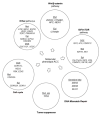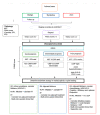Past, Present and Future of Epigenetics in Adrenocortical Carcinoma
- PMID: 32414074
- PMCID: PMC7281315
- DOI: 10.3390/cancers12051218
Past, Present and Future of Epigenetics in Adrenocortical Carcinoma
Abstract
DNA methylation profiling has been suggested a reliable technique to distinguish between benign and malignant adrenocortical tumors, a process which with current diagnostic methods remains challenging and lacks diagnostic accuracy of borderline tumors. Accurate distinction between benign and malignant adrenal tumors is of the essence, since ACC is a rare but aggressive endocrine disease with an annual incidence of about 2.0 cases per million people per year. The estimated five-year overall survival rate for ACC patients is <50%. However, available treatment regimens are limited, in which a radical surgical resection is the only curable option. Nevertheless, up to 85% of patients with radical resection show recurrence of the local disease often with concurrent metastases. Adrenolytic therapy with mitotane, administered alone or in combination with cytotoxic agents, is currently the primary (palliative) treatment for patients with advanced ACC and is increasingly used in adjuvant setting to prevent recurrence. Prognostic stratification is important in order to individualize adjuvant therapies. On April 1, 2020, there were 7404 publications on adrenocortical carcinoma (adrenocortical carcinoma) OR adrenocortical carcinoma [MeSH Terms]) OR adrenal cortex cancer[MeSH Terms]) OR adrenal cortical carcinoma [MeSH Terms]) OR adrenal cortex neoplasm [MeSH Terms]) OR adrenocortical cancer [MeSH Terms]), yet the underlying pathophysiology and characteristics of ACC is not fully understood. Knowledge on epigenetic alterations in the process of adrenal tumorigenesis is rapidly increasing and will add to a better understanding of the pathogenesis of ACC. DNA methylation profiling has been heralded as a promising method in the prognostication of ACC. This review summarizes recent findings on epigenetics of ACC and its role in diagnosis, prognosis and therapeutic strategies.
Keywords: DNA methylation; adrenocortical carcinoma; epigenetics.
Conflict of interest statement
The authors declare no conflict of interest.
Figures



References
-
- Herrera M.F., Grant C.S., van Heerden J.A., Sheedy P.F., Ilstrup D.M. Incidentally Discovered Adrenal Tumors: An Institutional Perspective. Surgery. 1991;110:1014–1021. - PubMed
Publication types
LinkOut - more resources
Full Text Sources
Miscellaneous

